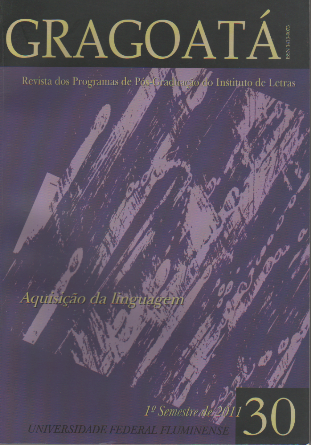A study on the acquisition of sentential complementation in Brazilian Portuguese: semantic traces of modality in first language acquisition
DOI:
https://doi.org/10.22409/gragoata.2011n30a32930Keywords:
Sentential Complementation, Realis/Irrealis Opposition, Brazilian PortugueseAbstract
This paper presents partial results about standards of sentential complementation, not only the finite completives (indicative and subjunctive mood) but also the not-finite (specifically the infinitive), in the acquisition of the Brazilian Portuguese. Based on the Theory of Principles and Parameters (cf. Chomsky, 1981) and on the hypothesis of the Realis/Irrealis opposition is marked by distinct standards of complementation, i.e., the infinitive and the indicative, for being acquired before the subjunctive mood, tend to express the traces [+- realis]. In this direction, the morphologic marker of infinitive assumes the trace [- realis] (that will be assumed later by the subjunctive mood) and the indicative, in finite clauses, expresses the [+ realis] trace. In this way, we base our analysis on the Semantic Opposition Hypothesis, according to which there is a semantic hierarchy as for the verbal ways in the period of acquisition. There has been analyzed data of three children, two pertaining the CEALL, of the Rio Grande do Sul, with age ranging from 1;08 and 3;07 and one belonging to CEDAE, UNICAMP, with age ranging from 1;0 and 3;02.
Downloads
Downloads
Published
How to Cite
Issue
Section
License
Authors who publish in Gragoatá agree to the following terms:
The authors retain the rights and give the journal the right to the first publication, simultaneously subject to a Creative Commons license CC-BY-NC 4.0, which allows sharing by third parties with due mention to the author and the first publication by Gragoatá.
Authors may enter into additional and separate contractual arrangements for the non-exclusive distribution of the published version of the work (for example, posting it in an institutional repository or publishing it in a book), with recognition of its initial publication in Gragoatá.

Gragoatá is licensed under a Creative Commons - Attribution-NonCommercial 4.0 International.














